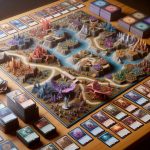Are you a fan of Magic the Gathering board game and looking for strategies to improve your gameplay? In this article, we will take an in-depth look at various tips and tricks to help you master the game and stay ahead of your opponents. Whether you are new to the game or a seasoned player, understanding the basics and mastering different playing styles is crucial for success.
We will cover everything from building a powerful deck to advanced strategies for winning the game. So, let’s dive into the world of Magic the Gathering and explore the best strategies for a victorious gameplay.
Magic the Gathering is a popular collectible card game that has been entertaining players for decades. Understanding its basic rules, card types, and mechanics is essential for anyone looking to excel in this game.
We will explore how to build a powerful deck by offering tips and tricks on card selection, deck composition, and successful gameplay decision making. Additionally, we will discuss the role of luck and chance in Magic the Gathering board game strategies, as well as how to stay ahead of your opponents.
Mastering different playing styles is another key aspect of excelling in Magic the Gathering. Whether you prefer an aggressive approach or a more defensive strategy, knowing how to adapt your gameplay style to different situations is crucial for success.
Throughout this article, we will provide insights into advanced strategies that can help you win more games and become a formidable opponent in any match. So, get ready to enhance your skills and take your Magic the Gathering gameplay to new heights.
Understanding the Basics of Magic the Gathering
Magic the Gathering is a complex and strategic board game that has captured the hearts of many players around the world. Understanding the basics of Magic the Gathering is crucial for success in the game. One of the key elements to grasp when delving into this game is understanding the different card types.
These include creatures, sorceries, instants, enchantments, artifacts, and lands. Each card type has its own unique abilities and functions, and players must strategize how to best use these cards to their advantage.
In addition to understanding card types, players also need to familiarize themselves with the five different colors of Magic: white, blue, black, red, and green. Each color represents certain characteristics and playstyles, so having a strong knowledge of each color will help players build more effective decks and make better decisions during gameplay.
Another fundamental aspect of Magic the Gathering is mana management. Mana is essential for casting spells and deploying creatures onto the battlefield. Knowing how much mana to have in your deck, as well as how to efficiently use it during gameplay, is crucial for success in this game.
| Key Elements | Description |
|---|---|
| Card Types | Understanding different card types such as creatures, sorceries, instants, enchantments, artifacts, and lands. |
| Colors of Magic | Understanding the characteristics and playstyles associated with each of the five colors: white, blue, black, red,and green. |
| Mana Management | Learning how to manage mana effectively for casting spells and deploying creatures. |
Building a Powerful Deck
When it comes to Magic the Gathering board game strategies, building a powerful deck is crucial for success. Whether you’re a beginner or an experienced player, following these tips and tricks can help you create a deck that will give you an edge in the game.
Here are some tips for building a powerful Magic the Gathering deck:
1. Know your playing style: Before building your deck, consider your preferred playing style. Are you more aggressive and like to attack quickly, or do you prefer a more defensive approach? Understanding your playing style will help you select the right cards for your deck.
2. Balance your mana curve: A well-balanced mana curve is essential for a powerful deck. Include a good mix of low-cost, mid-range, and high-cost spells and creatures to ensure that you have options at every stage of the game.
3. Focus on synergy: Look for cards that work well together and complement each other’s abilities. Synergy between cards can greatly enhance the effectiveness of your deck.
By taking these tips into consideration when building your Magic the Gathering deck, you can increase your chances of creating a powerful and competitive deck that will give you an advantage during gameplay. Remember that practice, experimentation with different card combinations, and knowledge of the current meta-game are all important factors in creating a successful deck to use in the game with friends or at local tournaments.
Mastering Different Playing Styles
When it comes to mastering different playing styles in Magic the Gathering board game, it’s important to understand that each style requires a unique approach and strategy. Whether you prefer an aggressive or defensive playstyle, adapting to different strategies can be the key to success in this game.
To help you navigate the diverse playing styles in Magic the Gathering, here are some tips and tricks to keep in mind:
- Aggressive Playstyle: If you prefer to take an aggressive approach, focus on building a deck with low-cost creatures and powerful combat spells. Utilize cards that allow you to attack quickly and put pressure on your opponents.
- Defensive Playstyle: For those who enjoy a more defensive strategy, prioritize cards that provide protection and control over the game. Incorporate counterspells, removal spells, and defensive creatures to slow down your opponent’s advances.
- Combo Playstyle: Players who excel at combo strategies should aim to create synergies between specific cards in their deck. Look for combinations that allow you to unleash powerful effects or win conditions when certain cards are played together.
Successfully mastering different playing styles requires practice, adaptability, and a deep understanding of your own preferences as a player. By honing your skills in various strategies, you can become a versatile Magic the Gathering player capable of taking on any opponent with confidence.
Remember that flexibility is key when it comes to mastering different playing styles – being able to switch between aggressive, defensive, or combo-oriented strategies based on your current match-up will greatly increase your chances of success.
By incorporating these tips into your gameplay, you can develop a well-rounded understanding of different playing styles and enhance your overall performance in Magic the Gathering board game. Whether you’re drawn to aggressive tactics, prefer a more conservative approach, or thrive on complex combo strategies, embracing versatility will undoubtedly elevate your skills as a player.
Advanced Strategies for Winning the Game
Once you have a good grasp of the basics and have built a powerful deck, it’s time to delve into advanced strategies for winning the Magic the Gathering board game. One key aspect of advanced gameplay is mastering different playing styles. This involves understanding the strengths and weaknesses of various strategies such as aggro, control, combo, and midrange. By familiarizing yourself with these playing styles, you can anticipate your opponent’s moves and plan your own strategies accordingly.
In addition to understanding playing styles, it’s important to focus on the importance of card selection and deck composition. Advanced players know that strategic card selection is crucial for achieving victory.
This means carefully considering which cards to include in your deck based on their abilities, mana cost, and synergy with other cards. Furthermore, paying attention to your deck composition – including the right balance of creature cards, spells, lands, and other types of cards – is essential for maximizing your chances of success.
When it comes to successful gameplay and decision making in Magic the Gathering, advanced players understand that staying ahead of their opponents is paramount. This involves not only having a solid game plan but also being able to adapt quickly and make calculated decisions on the fly. By staying one step ahead and continually assessing the board state and potential threats, you can increase your chances of outmaneuvering your opponents and achieving victory.
As you continue to hone your skills in Magic the Gathering board game strategies, it’s important to recognize the role of luck and chance in gameplay. Even with meticulous planning and strategic thinking, there will always be an element of unpredictability due to card draws and random effects. Advanced players acknowledge this aspect while minimizing its impact through careful deck construction, smart decision-making, and adaptability during gameplay.
The Importance of Card Selection and Deck Composition
In the world of Magic the Gathering board game, card selection and deck composition play a crucial role in determining the outcome of a match. Whether you are a seasoned player or a novice, understanding how to choose the right cards for your deck and how to effectively compose it can make all the difference in achieving victory. The process of building a deck is an art that requires careful consideration, strategic thinking, and knowledge of the game’s mechanics.
When selecting cards for your deck, it is important to consider their synergy with one another. Some cards may work well together to create powerful combos, while others may complement each other’s strengths and weaknesses.
Understanding the various card types, such as creatures, spells, enchantments, and artifacts, is essential in creating a well-balanced and versatile deck. Additionally, paying attention to the mana curve of your deck – the distribution of cards based on their mana cost – can help ensure that you have access to your spells and abilities at different stages of the game.
Deck composition also involves making decisions about the number of cards in each category that will make up your deck. While there are no strict rules about how many cards should be included in a deck, ensuring that it is consistent and focused on a specific strategy can greatly improve its performance during gameplay. Moreover, keeping track of banned or restricted cards in certain formats is essential when considering card selection and deck composition.
A well-constructed deck can make all the difference between winning and losing in Magic the Gathering board game. By mastering the art of card selection and understanding effective deck composition strategies, players can significantly increase their chances of success on the battlefield. With careful planning and consideration for various factors, including synergy between cards and mana curve distribution, players can create powerful decks that are capable of dominating their opponents.
Tips for Successful Gameplay and Decision Making
Magic the Gathering Board Game is not only about building a powerful deck and mastering different playing styles; successful gameplay and decision making are also crucial for victory. There are several tips that players can use to improve their gameplay and make better decisions during the game.
Know Your Deck
One of the most important aspects of successful gameplay is knowing your deck inside and out. Understanding the strengths and weaknesses of each card in your deck will allow you to make informed decisions during the game. Familiarize yourself with the synergies between your cards and how they can work together to create powerful combos.
Adapt to Your Opponent
Another key tip for successful gameplay is being able to adapt to your opponent’s strategies. Pay attention to their plays and adjust your own strategy accordingly. This may involve changing your approach mid-game or making unexpected moves to throw off your opponent’s plans.
Think Ahead
Successful decision making in Magic the Gathering Board Game often involves thinking several turns ahead. Consider the potential outcomes of your actions and anticipate what your opponent might do next. By planning ahead, you can make strategic plays that put you in a better position to win the game.
By following these tips for successful gameplay and decision making, players can improve their overall performance in Magic the Gathering Board Game. Understanding their deck, adapting to their opponents, and thinking ahead are all essential skills for achieving victory in this popular game.
How to Stay Ahead of Your Opponents
Staying ahead of your opponents in Magic the Gathering requires careful planning, strategy, and quick thinking. Whether you’re playing in a casual setting with friends or competing in tournaments, it’s important to stay one step ahead of your opponents to secure victory.
Anticipate Your Opponent’s Moves
One key way to stay ahead of your opponents is to anticipate their moves. This involves understanding their deck composition, playing style, and potential strategies. By paying close attention to the cards they play and the decisions they make, you can start to predict their next moves and plan accordingly. Additionally, knowing the popular strategies and trends in the current meta can give you an edge in anticipating your opponent’s actions.
Adapt Your Strategy
Another important aspect of staying ahead of your opponents is being able to adapt your strategy on the fly. If you notice that your opponent is building up a specific type of creature or spell, be prepared to adjust your game plan accordingly. This flexibility and adaptability will keep you one step ahead as you pivot to counter their tactics and maintain control of the game.
Utilize Mind Games
Mind games can also be a powerful tool for staying ahead of your opponents. By bluffing or making strategic moves that seem counterintuitive at first, you can confuse and mislead your opponents. This can force them into making mistakes or second-guessing their own strategy, giving you the upper hand. However, it’s important to use mind games sparingly and strategically rather than relying on them too heavily.
The Role of Luck and Chance in Magic the Gathering Board Game Strategies
In conclusion, mastering the strategies of Magic the Gathering board game requires a deep understanding of the game’s mechanics, an ability to adapt to different playing styles, and a keen sense of decision-making. It is important for players to understand that luck and chance play a significant role in the outcome of each game. While skill and strategy are crucial in winning, there is always an element of unpredictability that adds excitement and challenge to each match.
Despite the influence of luck and chance, players can still improve their chances of winning by creating powerful decks, mastering different playing styles, and making smart decisions during gameplay. By carefully selecting cards and composing a well-balanced deck, players can increase their odds of drawing useful cards and executing effective strategies. Additionally, understanding the importance of card selection and deck composition can give players an edge over their opponents.
In the end, successful Magic the Gathering board game strategies require a combination of skill, strategy, adaptability, and a bit of luck. By honing their skills and continuously improving their gameplay, players can enhance their chances of victory in this dynamic and competitive game. Whether participating in casual matches or competitive tournaments, applying these strategies can lead to more thrilling and rewarding experiences in the world of Magic the Gathering.
Frequently Asked Questions
What Are the Different Strategies in Magic: The Gathering?
In Magic: The Gathering, there are various strategies that players can employ to win the game. Some strategies focus on overwhelming opponents with powerful creatures, while others rely on using spells and enchantments to control the game’s tempo. Additionally, some players use combo decks to create game-winning synergies between specific cards.
How Do I Get Better at Magic: The Gathering?
To improve at Magic: The Gathering, players should familiarize themselves with the rules of the game and understand the different card types and mechanics. Developing a deeper understanding of the metagame and popular deck archetypes can also help players anticipate their opponent’s strategies.
Engaging in regular gameplay and seeking feedback from more experienced players can further enhance one’s skills.
Is MTG a Strategy Game?
Yes, Magic: The Gathering is widely considered a strategy game due to its complexity and depth. Players must carefully manage their resources, plan ahead, and adapt to ever-changing game states in order to outmaneuver their opponents. The ability to think critically and form effective long-term plans is crucial for success in MTG.

I love playing all kinds of games – from classics like Monopoly to modern favourites like Ticket to Ride.
I created this blog as a way to share my love of board games with others, and provide information on the latest releases and news in the industry.





